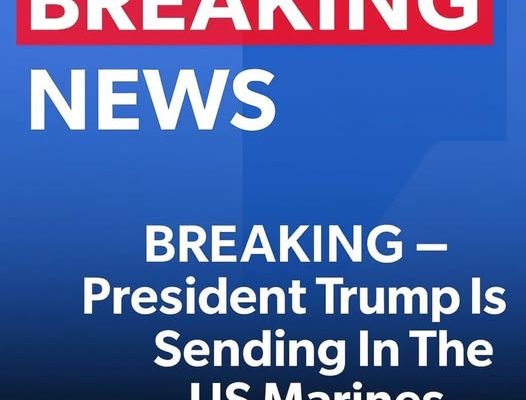In recent weeks, the United States military has confirmed a notable move that has sparked both curiosity and debate across the country. A deployment of 200 U.S. Marines has been directed to Florida, where they will provide assistance to the U.S. Immigration and Customs Enforcement agency (ICE). According to officials, these Marines will not be involved in law enforcement actions but will serve in logistical and administrative support roles within detention and processing facilities.
This decision is part of a larger initiative aimed at reinforcing immigration operations in states where migration issues are particularly complex and resource-intensive, including Louisiana, Texas, and Florida. While government leaders describe this step as a way to improve efficiency and relieve pressure on agencies already facing heavy workloads, the move has also prompted widespread discussions about the presence of military personnel in roles traditionally managed by civilian agencies.
To fully understand the situation, it is essential to look beyond headlines and explore the historical context, the reasons for this deployment, public reactions, and the potential long-term effects on both immigration policy and civil-military relations in the United States.
Historical Background: Military Support in Civil Roles
The use of the U.S. military in supporting civilian agencies is not entirely new. Throughout American history, the military has occasionally been called upon to assist during times of crisis or heightened demand. For example:
-
Disaster Response: Soldiers and Marines have often provided logistical and humanitarian aid after hurricanes, floods, and wildfires.
-
Public Health Emergencies: During the COVID-19 pandemic, military personnel supported vaccination efforts, ran testing sites, and provided medical supplies.
-
Border Assistance: In past administrations, military forces have been temporarily deployed to support Customs and Border Protection (CBP) with surveillance, transportation, and construction of infrastructure like fencing.
However, a crucial detail separates these roles from law enforcement: the Posse Comitatus Act, which limits the direct use of military personnel in domestic policing activities. For this reason, Marines in this current deployment will not conduct arrests, patrol communities, or enforce immigration laws. Their duties will instead focus on behind-the-scenes support.
Why Florida, Texas, and Louisiana?
The states selected for this initiative—Florida, Texas, and Louisiana—have been at the forefront of immigration debates in recent years. Each faces unique challenges:
-
Florida serves as both a destination and transit point for migrants arriving from the Caribbean and Latin America. Its coastal geography makes it a critical hub for immigration enforcement and humanitarian response.
-
Texas, sharing the longest stretch of border with Mexico, consistently experiences high levels of migration. The state’s detention centers and processing facilities are often under heavy strain.
-
Louisiana, while not a border state, houses multiple immigration detention centers and plays a key role in federal immigration logistics.
Officials argue that reinforcing these states with additional manpower—particularly in non-law enforcement functions—will help ensure that ICE officers and civilian staff can focus more effectively on their core responsibilities.
The Specific Role of the Marines
According to official statements, the 200 U.S. Marines deployed will handle responsibilities such as:
-
Administrative Processing: Managing case files, entering data, and coordinating logistics for detainees.
-
Facility Support: Ensuring supplies are distributed, maintenance is overseen, and day-to-day operations run smoothly.
-
Transportation Assistance: Helping coordinate safe transfers of individuals between facilities.
-
Medical Logistics: Supporting the delivery of healthcare services by handling equipment and supplies.
By assigning Marines to these areas, ICE leaders hope to alleviate stress on their civilian workforce, which has faced increasing workloads as immigration numbers fluctuate.
Public Reactions: Support and Criticism
As with many issues involving immigration policy, the decision to involve Marines has sparked divided opinions.
Supporters Say:
-
Efficiency Boost: Proponents argue that the Marines will bring discipline, organization, and much-needed manpower to a system that is already stretched thin.
-
Relief for ICE Staff: Civilian employees and ICE officers may benefit from having additional help with administrative tasks, allowing them to focus on casework and enforcement decisions.
-
Non-Law Enforcement Role: Since Marines are not participating in arrests or patrols, some view this as a balanced compromise between reinforcing resources and respecting legal boundaries.
Critics Raise Concerns:
-
Optics of Military Uniforms: Even if Marines are not enforcing laws, their presence in immigration facilities could be perceived as blurring the line between military and civilian authority.
-
Civil Liberties Questions: Advocacy groups worry that involving the military, even indirectly, in immigration detention may intimidate vulnerable populations or set a precedent for further military involvement in civilian matters.
-
Policy Symbolism: Some critics view the move less as a practical step and more as a political statement, suggesting that immigration is being framed as a matter requiring military attention rather than social and humanitarian solutions.
Voices from the Community
Community leaders, advocacy organizations, and local officials have weighed in on this development.
-
Local Officials in Florida have expressed cautious optimism, noting that while the additional personnel may help facilities operate more smoothly, they want assurances that Marines will not cross into enforcement actions.
-
Immigration Advocates stress the importance of ensuring detainees’ rights and maintaining transparency about the Marines’ responsibilities. They warn that even symbolic changes in detention centers can affect public trust.
-
Veterans’ Groups have also commented, with some stating that while Marines are well-trained for high-pressure environments, extended assignments in administrative roles could pose challenges for morale and long-term readiness.
Political Implications
Immigration has long been one of the most debated issues in U.S. politics. The decision to deploy Marines adds a new layer to that conversation.
-
For Supporters of Stronger Enforcement: This move is seen as evidence of the federal government’s commitment to addressing immigration challenges with all available resources.
-
For Critics of Military Involvement in Civil Matters: It raises concerns about the militarization of immigration policy, even if the Marines’ roles remain strictly logistical.
-
For Policymakers: The development provides an opportunity to revisit questions about how best to balance humanitarian considerations, resource management, and enforcement priorities.
Potential Long-Term Consequences
Several possible outcomes could emerge from this initiative:
-
Operational Efficiency Gains: If the Marines’ involvement leads to smoother facility management and less strain on ICE staff, the model could be repeated in other states.
-
Public Backlash: If the optics or execution of the plan draw significant criticism, policymakers may reconsider or limit the scope of similar deployments in the future.
-
Policy Precedent: The decision may influence how future administrations approach immigration challenges, potentially shaping debates about the role of the military in domestic matters.
-
Impact on Marines’ Readiness: Extended deployments in administrative roles could affect military training cycles and raise questions about whether such tasks align with the core mission of the Marine Corps.
Broader Context: Immigration Challenges in the U.S.
To place this story in perspective, it is important to understand the broader immigration landscape. The U.S. faces multiple, overlapping challenges, including:
-
Rising Numbers at the Border: Migration patterns fluctuate but have recently placed unprecedented demand on processing systems.
-
Detention Capacity: Facilities often struggle to keep up with the volume of cases, leading to concerns about overcrowding and conditions.
-
Legal Backlogs: Immigration courts face significant delays, with cases sometimes taking years to resolve.
-
Humanitarian Concerns: Advocates highlight the need to ensure migrants, especially families and children, are treated with dignity and provided access to basic services.
Against this backdrop, the deployment of Marines is one attempt—albeit a controversial one—to manage these pressures.
Looking Ahead
As the deployment unfolds, several key questions remain:
-
How long will the Marines remain assigned to ICE facilities?
-
Will this move set a precedent for more military involvement in immigration operations?
-
How will communities, advocacy groups, and international observers interpret the presence of military uniforms in detention centers?
-
Will the initiative achieve its intended goal of improving efficiency, or will it create new challenges?
The answers to these questions will become clearer over time as policymakers, communities, and the public evaluate the results.
Conclusion
The assignment of 200 U.S. Marines to assist Immigration and Customs Enforcement in Florida marks a significant and complex development in America’s ongoing immigration debate. While the Marines’ responsibilities will remain strictly limited to non-law enforcement duties such as logistics and administration, their presence highlights the scale of challenges facing immigration authorities.
Supporters see the move as a practical step to enhance efficiency and provide relief to overwhelmed staff. Critics worry that it could blur the boundaries between military and civilian roles or create unintended consequences for public trust and civil liberties.
Ultimately, this deployment underscores the broader tension at the heart of U.S. immigration policy: how to balance enforcement, humanitarian needs, and resource management in a way that aligns with the nation’s values and legal frameworks. Whether the involvement of Marines proves to be a temporary fix or a turning point in policy remains to be seen, but it is a decision that has already sparked nationwide discussion and will continue to influence debates in the months ahead.



